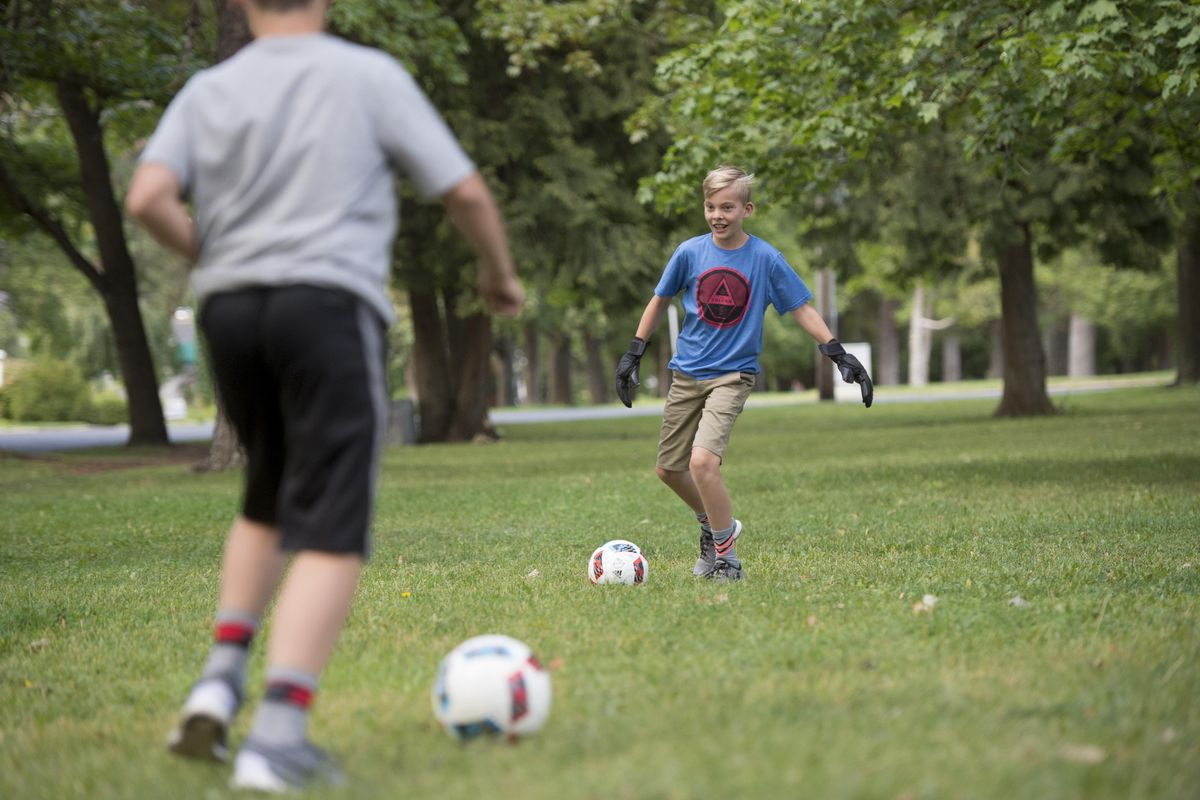Spokane 12-year-old learning how to live with Crohn’s disease

Twelve-year-old Nolan Stewart’s smile lights up a room, but last year at this time he wasn’t smiling much.
“I was just sick, tired and exhausted,” he said.
He’d been struggling with constant stomach aches.
“At first we just thought it was something he ate,” said his mother, Nicole Stewart.
But when her parents came to visit and her mother remarked that it looked like Nolan had lost weight since they’d seen him a month earlier, Stewart knew it was more than just an upset tummy.
It took two months of extensive medical testing to reach a diagnosis – including what Nolan calls an “upper and a downer” – a colonoscopy and endoscopy.
In August 2015, his diagnosis was confirmed – Crohn’s disease.
Crohn’s disease is a subtype of inflammatory bowel disease, a chronic inflammatory condition of the intestine. About 1.6 million people in the United States have IBD, and 80,000 of those are younger than 18, according to the Crohn’s and Colitis Foundation of America.
Or as Nolan puts it, “It can affect everything from mouth to butt.”
Obtaining a correct diagnosis can be difficult because symptoms vary widely. Among them, abdominal discomfort, diarrhea, blood in the stool and weight loss, as well as recurrent fevers, rash, mouth ulcers, anemia, and even joint pain, said Dr. Monica Zherebtsov, a pediatric gastroenterologist at Sacred Heart Children’s Hospital and Nolan’s physician, in an email interview.
Once a patient has been diagnosed, finding the right treatment is crucial.
“Without treatment, severe complications may occur and may result in growth failure, stunting, surgical complications, infections and prolonged hospitalizations,” Zherebtsov said.
For Nolan’s parents, finding the right course of action was difficult.
“There’s no one-size-fits-all treatment,” Stewart said.
They tried several different medications, but “My liver didn’t like them much,” Nolan said.
He’s having more success with a treatment called Remicade.
“I get infusions every eight weeks. So far, I’ve had 5 infusions,” he said. “Luckily, I’m pretty good about getting poked with needles and IVs.”
For Nolan the debilitating pain of Crohn’s has been the worst part.
“He missed 40-some days of school last year,” Stewart said.
Even worse, the usually energetic young man had to curtail his sports activities.
“I had to quit baseball, soccer and basketball all at once,” he said. “I’ve been feeling a lot better now that I’ve been on Remicade, but it is still hard having Crohn’s.”
The disease is manageable, Zherebtsov said. With appropriate therapy, patients can go into remission and minimize long-term complications such as growth failure. There are even Olympic athletes with Crohn’s disease, the doctor said, pointing to swimmer Kathleen Baker who was on this year’s swim team.
Having a role model he could relate to proved pivotal for Nolan. At last year’s Crohn’s and Colitis Take Steps Walk, an annual fundraiser for the Crohn’s and Colitis Foundation of America, Nolan met Brian Ward, 20, a student at Gonzaga University and last year’s Honored Hero for the event.
“I was diagnosed with IBD at 12,” said Ward, who’s from Tacoma. “I’d been having flu-like symptoms including painful diarrhea and vomiting. I was utterly exhausted.”
He was also painfully skinny because his body couldn’t absorb the nutrition needed to grow.
Through trial and error they found an infusion therapy that helps manage the disease.
“Once I got healthy and figured out the medication, it was like night and day,” Ward said. “My family had a century celebration when I finally weighed 100 pounds!”
The diagnosis changed his life. Ward plans to pursue a medical degree and wants to be on the forefront of finding a cure for IBD.
He’s active in the local support group that Nolan and his mom helped restart and he volunteers at Camp Oasis – a summer camp for kids with IBD.
Nolan got to hang out with him there this summer.
“At first I was nervous,” said Nolan. “It was my first time away from home. But I had so much fun that I’m gonna go again next year!”
Ward said, “My doctor and nurse practitioner told me to never let this disease stop me from doing something I want to do.”
He took their words to heart and is currently studying abroad in Scotland for a semester.
He’s also active in raising awareness and funding for the Crohn’s and Colitis Foundation of America and is hopeful a cure will be found.
Nolan is following in Ward’s footsteps and is the Honored Hero for this year’s Take Steps Event. He’s named his team No Guts No Glory and said fundraising is going well.
“My brother and I have been holding lemonade stands this summer to raise money. So far, we’ve raised just over $2,000 thanks to family, friends and people I’ve never met!”
The Sacajawea Middle School seventh-grader is slowly adding some activities back into his life, including soccer.
Zherebtsov said, “Nolan is a delightful young man who has met his health challenges with a positive attitude and resilience.”
But Nolan’s positive attitude doesn’t diminish the unpleasantness of living with Crohn’s disease.
“It feels like you are getting punched in the gut or have food poisoning,” he said. “I’m tired a lot of the time and I can’t eat all the foods I once ate.”
Then he flashed a grin.
“But I’m not gonna let Crohn’s take over my life.”